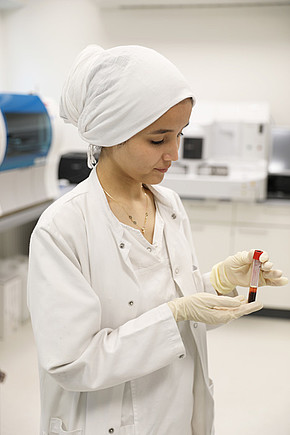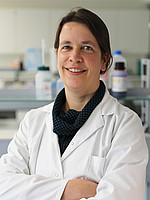
Welcome to the overview of internships and courses that the Biomedical Sciences Bachelor Degree Programme offers in English for incoming exchange students.
For further information on internships, academic issues, courses, course selection and provisional learning agreements, please, contact the international coordinator of the Biomedical Sciences Programme, Geja Oostingh (geja.oostingh@fh-salzburg.ac.at).
Primarily we do offer internships to our Erasmus partners at our partner, the SALK University Hospital Salzburg, in the field of:
- Microbiology (ISO certified)
- Haematology
- Clinical Chemistry
- Histology / Pathology
- Immunology /Allergy
- Molecular Biology
- Human Genetics
- Sports medicine
- Pulmonary function testing
For administrative issues, please, contact the Incoming Students Coordinator at International Office.
Please note: The majority of courses in Biomedical Sciences are held in German only!
Courses in English (INTL-Code 5)
Case Studies Haematological Laboratory Diagnostics 2
Semester 3 | Academic year: 2 | Course code: BMAB3CH2IL | Type: IL | INTL-Code: 5 | SWS: 1 | ECTS-Credits: 1
Course contents: Performance and interpretation of haematological methods. Linking the obtained information to other relevant disciplines (for example haemostaseology and clinical chemistry). Literature search for relevant and recent publications, also in the English language. Presentation of haematological case reports.
Language: English.
Superior module: Haematology and Immunohaematology
Module description: The graduates of this module know the main diseases of the blood building system including the clinical symptoms and diagnostics. They can differentiate and judge pathological and non-pathological blood and bone marrow smears based on morphological criteria. The graduates understand the ABO and the Rhesus system, as well as antigens of leukocytes and thrombocytes, and know the importance of these factors for transfusion medicine. They understand the theoretical basics of different detection methods and can perform selected immunohaematological techniques. They know the importance of quality assurance and documentation. They can process clinical case studies, perform the laboratory analysis belonging to these case studies and interpret the results.
Internationalisation in Biomedical Sciences
Semester 3 | Academic year: 2 | Course code: BMAB3IBSIL | Type: IL | INTL-Code: 5 | SWS: 2 | ECTS-Credits: 2
Course contents: Understanding and explaining English texts. Enhancing biomedical sciences-specific language skills (spoken and written). Working of internationalization subjects in the field of biomedical sciences.
Language: English.
Superior module: Social Competences 2
Module description: The graduates of this module have enhanced social-communicative competences and self-competences. The can realistically judge their own professional, organisational, coordinative and administrative skills, based on the requirements needed as a biomedical scientist. They know the meaning of diversity with respect to the patients and colleagues. They know the need for life-long learning in order to ensure the quality of their profession as a biomedical scientist.
Topics in Molecular Biology
Semester 4 | Academic year: 2 | Course code: BMAB4IMBVO | Type: VO | INTL-Code: 5 | SWS: 1 | ECTS-Credits: 1
Course contents: Guest lectures in current technologies and laboratory methods using molecular biological techniques, such as molecular biological laboratory analytics, reproductive medicine, forensic or tumour therapy.
Language: English.
Superior module: Molecular Biology and Genetics
Module description: The graduates of this module know the cellular molecular mechanisms and have basic knowledge in the fields of molecular biology, classical genetics and human genetics. They know classical and novel analytical methods and their areas of use in molecular diagnostics, research, gene therapy, gene technologies. They can apply molecular biological databases based on specific cases. The graduates can test the results for their plausibility, taking into account the different measures for quality assurance, they can integrate these results in the broader picture and connect and defend the findings in relation to the chosen scientific question.
Case Studies Molecular Biological Laboratory Diagnostics
Semester 4 | Academic year: 2 | Course code: BMAB4CSMIL | Type: IL | INTL-Code: 5 | SWS: 1 | ECTS-Credits: 1
Course contents: Application of molecular biological techniques related to subject-specific case studies. Independent work on subject-specific cases based on literature and practise.
Language: English.
Superior module: Molecular Biology and Genetics
Module description: The graduates of this module know the cellular molecular mechanisms and have basic knowledge in the fields of molecular biology, classical genetics and human genetics. They know classical and novel analytical methods and their areas of use in molecular diagnostics, research, gene therapy, gene technologies. They can apply molecular biological databases based on specific cases. The graduates can test the results for their plausibility, taking into account the different measures for quality assurance, they can integrate these results in the broader picture and connect and defend the findings in relation to the chosen scientific question.
Case Studies Cellular Biological Laboratory Diagnostics
Semester 4 | Academic year: 2 | Course code: BMAB4CSCIL | Type: IL | INTL-Code: 5 | SWS: 1 | ECTS-Credits: 1
Course contents: Case studies in the field of gynaecological cytology. DNA-cytometry in gynaecological cytology. Independent application of theoretical and practical skills acquired in cell culture.
Language: English
Superior module: Cell Biology and Cell Diagnostics
Module description: The graduates of this module have acquired knowledge on the cellular biological processes and morphological basics of healthy and pathologically altered cells in vivo and in vitro. They know the different methods for preparing cytological preparations and the criteria for benign and malignant changes in gynaecological cytology. They can, based on the different kinds of nomenclature, process the test results and know the relationship between histological and cytological results in the scope of quality assurance in gynaecological cytology. They know the basics of cell culture techniques and working under sterile conditions. They know different types of cells. They can use their knowledge in theory and practice, including in case studies, and can connect their knowledge to other biomedical areas
In total ECTS: 6
As an accepted incoming student you can also choose among the courses offered by the International Office.
International Departmental Coordinator

Department Health Sciences
Head of Degree Programme Biomedical Sciences
Biomedical Sciences
Head of Research
Research Health Sciences
Head of Research
Research Group Advances in Resilient Health Systems and Health Education
Head of Research
Research Group Advances in Diagnostics and Medical Sciences
| Location: | Campus Urstein |
|---|---|
| Room: | Urstein - 379 |
| T: | +43-50-2211-1410 |
| E: | geja.oostingh@fh-salzburg.ac.at |
